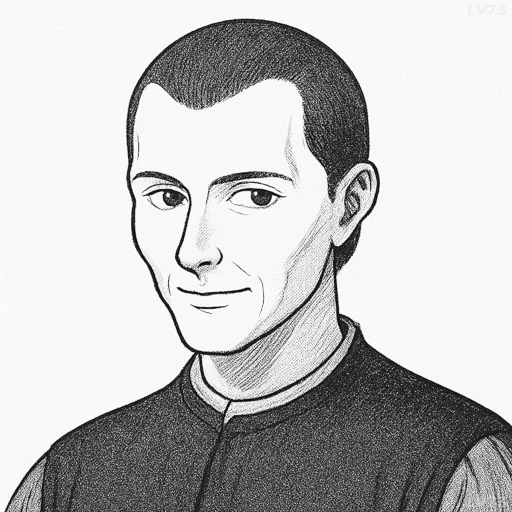“It is necessary for him who lays out a state and arranges laws for it to presuppose that all men are evil and that they are always going to act according to the wickedness of their spirits whenever they have free scope.”

- May 3, 1469 – June 21, 1527
- Born in the Republic of Florence (Italy)
- Political thinker and diplomat
table of contents
Quote
“It is necessary for him who lays out a state and arranges laws for it to presuppose that all men are evil and that they are always going to act according to the wickedness of their spirits whenever they have free scope.”
Explanation
In this quote, Niccolò Machiavelli presents a pessimistic view of human nature that underpins much of his political philosophy. He argues that those who design a state and establish its laws should assume that people are inherently evil, or at least self-interested and prone to act immorally if given the opportunity. According to Machiavelli, humans are driven by ambition, greed, fear, and other negative emotions, and left unchecked, these forces will lead individuals to pursue their own gain at the expense of others. Therefore, any political system or legal framework must be based on the assumption that people will act in their own self-interest, and the lawgiver must create institutions, policies, and safeguards that mitigate or control these tendencies.
This perspective is in stark contrast to more idealistic views of human nature, which assume that people are essentially good and capable of moral progress. Machiavelli’s view, however, is deeply rooted in the political realities of his time. Living in Renaissance Italy, a period marked by political intrigue, frequent betrayal, and constant warfare, Machiavelli witnessed firsthand how power could corrupt individuals and lead to ruthless actions in pursuit of dominance. For Machiavelli, the goal of a ruler or legislator is not to reform human nature but to manage it, recognizing that the wickedness in people is an inevitable part of life. As a result, he recommends that rulers use force, cunning, and manipulation to maintain order and control over society, rather than relying on moral persuasion or ideals of justice.
In modern contexts, this view remains relevant in lawmaking, political strategy, and even organizational leadership. Politicians and policy-makers often design systems with the assumption that people will exploit loopholes or act out of self-interest if given the chance. This might lead to the creation of regulations, surveillance, or checks and balances designed to prevent individuals from taking advantage of the system. Similarly, in corporate settings, companies often assume that employees will act in their own best interest, which is why there are often rules, performance monitoring, and incentives in place to ensure that their actions align with company goals. Machiavelli’s quote suggests that in the world of governance and leadership, one must always account for the worst in people’s nature and design systems that anticipate and control for this reality.
Would you like to share your impressions or related stories about this quote in the comments section?
